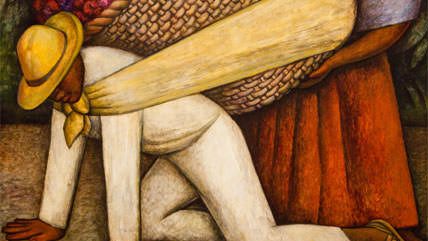Farmworkers Battle Unions and Bureaucrats
The agency formed so workers have a voice won't let them use that voice.

SACRAMENTO—"History will judge societies and governments—and their institutions—not by how big they are or how well they serve the rich and the powerful, but by how effectively they respond to the needs of the poor and the helpless," said Cesar Chavez, the renowned labor leader whose legacy often is invoked in the state Capitol.
In a strange twist, the agency his activism helped form—the California Agricultural Labor Relations Board— gave short-shrift to about 50 "poor and helpless" farmworkers who filled the board's auditorium last Tuesday during its public meeting.
In 1975, Gov. Jerry Brown signed into law the act that established the board. Its intent, now enshrined in the labor code, is to ensure "the right of agricultural employees to full freedom of association, self-organization, and designation of representatives of their own choosing."
The assembled farmworkers were treated politely but their long-standing concerns—that they are being denied the right to select their own labor representatives—have been ignored. Neither the governor nor any legislative leaders have been there to help them.
What gives?
In the days of Chavez, farmworkers often were mistreated by the "rich and powerful" agri-businesses. But these farmworkers were there this week to protest the actions of the organizations Chavez helped form—the United Farm Workers (UFW) union and that labor board, which they say are trying to squelch their voices.
It's one thing to take on agri-business, but there's not much political sympathy in Sacramento now for those—even the poor and downtrodden—who take on unions.
The workers are employees of one of the nation's largest fruit growers, Gerawan Farming in the Fresno area. In 1990, while Chavez was still alive, the UFW won a vote to represent the workers there. Then, the union disappeared from the scene. UFW officials won't publicly say why they left, and they did not respond to my request for an interview.
But 22 years later, the UFW came back to the farm and said that under state law the owners must negotiate with them. They said farmworkers there must pay 3 percent of their earnings in dues. Gerawan has more then 5,000 employees, more than the total membership of the once-mighty UFW. This could be a financial windfall for the union.
Last April, the board—whose members are appointed by the governor, then approved by the Senate—sided with the union, rejecting the argument that by abandoning the site for 20 years that it lost its right to represent the workers there.
So Gerawan workers collected signatures to force a vote on whether to decertify UFW's representation. The board claimed that too many signatures were invalid. The workers collected signatures again, but the board rejected them by citing company pressure—even though the company allowed officials to hold seminars explaining to workers their union rights.
After a series of protests the board allowed the workers to vote, but five months after the vote it still refuses to count the ballots, which are stored at its offices.
"The matter is in a process before the board," the agency's acting executive secretary Paul Starkey told me. He wouldn't provide a timeline, but said the agency is a "neutral" body that is working through two separate "administrative tracks" (relating in part to unfair-labor practice allegations) before counting the votes.
Critics believe that Gerawan farmworkers are getting the bureaucratic run-around from an agency that is far from impartial. They wonder how many months voters should have to wait to have their votes counted. If the agency believes the vote was unfair, they say it should hold another one — at any time.
It is ironic that an agency formed so workers have a voice won't let them use that voice because the agency might not like what it hears. On Tuesday, board officials ended public comments after the workers kept making the same point. "It's repeating the same thing because our point is the same point, to count the votes," organizer Silvia Lopez said.
How will history judge the government's refusal to do so? I can only imagine Cesar Chavez's answer.
Editor's Note: As of February 29, 2024, commenting privileges on reason.com posts are limited to Reason Plus subscribers. Past commenters are grandfathered in for a temporary period. Subscribe here to preserve your ability to comment. Your Reason Plus subscription also gives you an ad-free version of reason.com, along with full access to the digital edition and archives of Reason magazine. We request that comments be civil and on-topic. We do not moderate or assume any responsibility for comments, which are owned by the readers who post them. Comments do not represent the views of reason.com or Reason Foundation. We reserve the right to delete any comment and ban commenters for any reason at any time. Comments may only be edited within 5 minutes of posting. Report abuses.
Please to post comments


At what point can they take this to federal court?
Or state; either way, it seems someone ought to want to take on such a cause.
Take it to court? Who are you kidding?!!? So instead of giving your hard-earned money to union parasites, for the privilege of having your blood sucked, you can give it to lawyer-parasites, who will suck your guts out instead?!?! What gives?!?! FAR more sensible would be to give ALL of your money to the Church of Scienfoology, who will teach you how to most effectively suck butt with Government Almighty (Praises Be!!!). ! To learn more about Scienfoology, please see http://www.churchofSQRLS.com ?